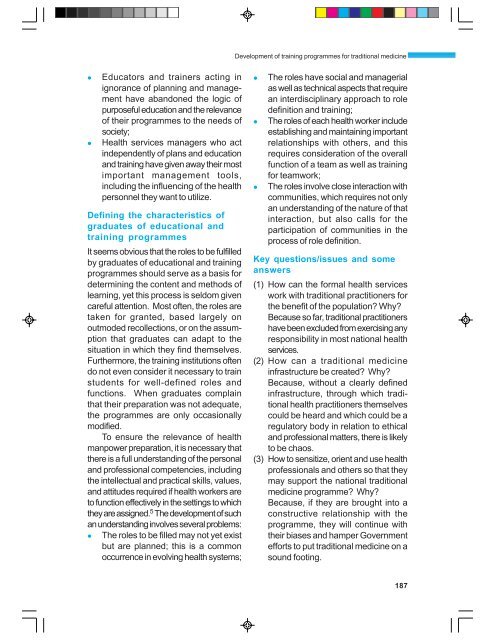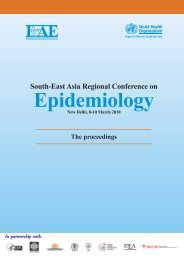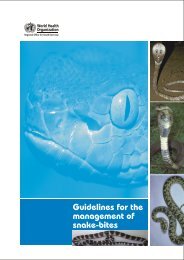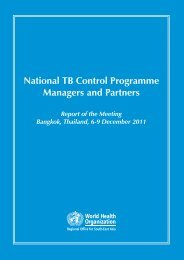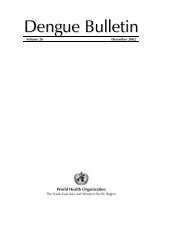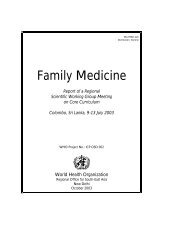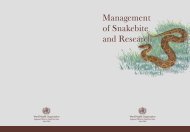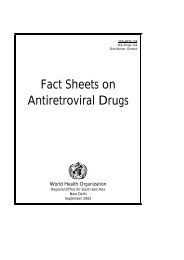Traditional Medicine in Asia
Traditional Medicine in Asia
Traditional Medicine in Asia
You also want an ePaper? Increase the reach of your titles
YUMPU automatically turns print PDFs into web optimized ePapers that Google loves.
� Educators and tra<strong>in</strong>ers act<strong>in</strong>g <strong>in</strong><br />
ignorance of plann<strong>in</strong>g and management<br />
have abandoned the logic of<br />
purposeful education and the relevance<br />
of their programmes to the needs of<br />
society;<br />
� Health services managers who act<br />
<strong>in</strong>dependently of plans and education<br />
and tra<strong>in</strong><strong>in</strong>g have given away their most<br />
important management tools,<br />
<strong>in</strong>clud<strong>in</strong>g the <strong>in</strong>fluenc<strong>in</strong>g of the health<br />
personnel they want to utilize.<br />
Def<strong>in</strong><strong>in</strong>g the characteristics of<br />
graduates of educational and<br />
tra<strong>in</strong><strong>in</strong>g programmes<br />
It seems obvious that the roles to be fulfilled<br />
by graduates of educational and tra<strong>in</strong><strong>in</strong>g<br />
programmes should serve as a basis for<br />
determ<strong>in</strong><strong>in</strong>g the content and methods of<br />
learn<strong>in</strong>g, yet this process is seldom given<br />
careful attention. Most often, the roles are<br />
taken for granted, based largely on<br />
outmoded recollections, or on the assumption<br />
that graduates can adapt to the<br />
situation <strong>in</strong> which they f<strong>in</strong>d themselves.<br />
Furthermore, the tra<strong>in</strong><strong>in</strong>g <strong>in</strong>stitutions often<br />
do not even consider it necessary to tra<strong>in</strong><br />
students for well-def<strong>in</strong>ed roles and<br />
functions. When graduates compla<strong>in</strong><br />
that their preparation was not adequate,<br />
the programmes are only occasionally<br />
modified.<br />
To ensure the relevance of health<br />
manpower preparation, it is necessary that<br />
there is a full understand<strong>in</strong>g of the personal<br />
and professional competencies, <strong>in</strong>clud<strong>in</strong>g<br />
the <strong>in</strong>tellectual and practical skills, values,<br />
and attitudes required if health workers are<br />
to function effectively <strong>in</strong> the sett<strong>in</strong>gs to which<br />
they are assigned. 5 The development of such<br />
an understand<strong>in</strong>g <strong>in</strong>volves several problems:<br />
� The roles to be filled may not yet exist<br />
but are planned; this is a common<br />
occurrence <strong>in</strong> evolv<strong>in</strong>g health systems;<br />
Development of tra<strong>in</strong><strong>in</strong>g programmes for traditional medic<strong>in</strong>e<br />
� The roles have social and managerial<br />
as well as technical aspects that require<br />
an <strong>in</strong>terdiscipl<strong>in</strong>ary approach to role<br />
def<strong>in</strong>ition and tra<strong>in</strong><strong>in</strong>g;<br />
� The roles of each health worker <strong>in</strong>clude<br />
establish<strong>in</strong>g and ma<strong>in</strong>ta<strong>in</strong><strong>in</strong>g important<br />
relationships with others, and this<br />
requires consideration of the overall<br />
function of a team as well as tra<strong>in</strong><strong>in</strong>g<br />
for teamwork;<br />
� The roles <strong>in</strong>volve close <strong>in</strong>teraction with<br />
communities, which requires not only<br />
an understand<strong>in</strong>g of the nature of that<br />
<strong>in</strong>teraction, but also calls for the<br />
participation of communities <strong>in</strong> the<br />
process of role def<strong>in</strong>ition.<br />
Key questions/issues and some<br />
answers<br />
(1) How can the formal health services<br />
work with traditional practitioners for<br />
the benefit of the population? Why?<br />
Because so far, traditional practitioners<br />
have been excluded from exercis<strong>in</strong>g any<br />
responsibility <strong>in</strong> most national health<br />
services.<br />
(2) How can a traditional medic<strong>in</strong>e<br />
<strong>in</strong>frastructure be created? Why?<br />
Because, without a clearly def<strong>in</strong>ed<br />
<strong>in</strong>frastructure, through which traditional<br />
health practitioners themselves<br />
could be heard and which could be a<br />
regulatory body <strong>in</strong> relation to ethical<br />
and professional matters, there is likely<br />
to be chaos.<br />
(3) How to sensitize, orient and use health<br />
professionals and others so that they<br />
may support the national traditional<br />
medic<strong>in</strong>e programme? Why?<br />
Because, if they are brought <strong>in</strong>to a<br />
constructive relationship with the<br />
programme, they will cont<strong>in</strong>ue with<br />
their biases and hamper Government<br />
efforts to put traditional medic<strong>in</strong>e on a<br />
sound foot<strong>in</strong>g.<br />
187


